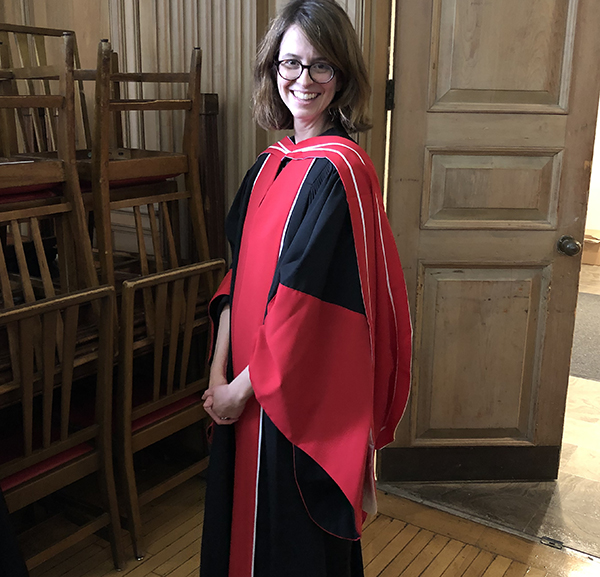By Rebecca Biason

Working as a general internist on busy hospital wards, Lauren Lapointe-Shaw was struck by how many patients were returning to hospital after being discharged. Some were experiencing adverse effects from their medication, while others, who had been unable to leave their houses to attend outpatient appointments, were arriving by ambulance to hospital emergency departments.
“It seemed that there were many opportunities for improvement and a need to better understand how readmission risk relates to the timing of discharge and physician follow-up,” said Lapointe-Shaw. “I wanted to understand how people access care after they are discharged.”
In North America, readmission among certain patient groups is quite common, somewhere in the range of 10-20%. Many of these readmissions and hospitalizations are also expensive for the health care system, and Lapointe-Shaw believes some of these could be avoided since patients are in hospital care right up until discharge.
“We are responsible for their care right up until they leave us, which is a huge opportunity to optimize their care and avoid the risk of them coming back,” she says.
Within the Clinical Epidemiology program at the Institute of Health Policy, Management and Evaluation, Lapointe-Shaw conducted a three-part thesis, exploring the influence of financial incentives on physician follow-up, the effects of a community pharmacy medication review on readmissions, and the risks patients face when discharged during the holiday period.
“The holiday discharge study resulted in some interesting findings. The people who had a greater holiday-related risk of readmission were those who had the lowest baseline risk for readmission, meaning they were not the sickest, but healthier,” said Lapointe-Shaw.
One possibility for this Lapointe-Shaw says is that health care providers might normally identify a higher risk patient and go to greater lengths to ensure they receive follow-up care, whereas a person who is perceived to be a bit healthier might not be monitored as closely especially around the holidays.
In examining the billing code for physicians introduced In 2006, Lapointe-Shaw also found that while physicians were indeed claiming the small extra payment when they followed-up with a patient post-discharge, the incentive did not change their behavior or increase their follow-up rates with patients.
“It is important to take into account that outpatient physicians don’t always know that a patient was hospitalized until that early follow-up window has closed,” said Lapointe-Shaw. “Other studies have shown there is a lack of communication between outpatient providers and hospitals, which limits the effect any financial incentive might have.”
Lapointe-Shaw’s dissertation is just the beginning of her career and research as a clinician scientist. She is hopeful that her research will help improve post-discharge patient outcomes, while she also aims to continue researching transitions for patients from hospital to home as well as which patient groups have reduced access to outpatient care and services.
“I can’t thank my supervisor Dr Chaim Bell and the Director of the Clinical Epidemiology program Dr. Robert Fowler enough. Dr Bell inspired me to become a researcher, among so many other things. Dr Fowler goes above and beyond everyday to make sure all of us, as students, feel supported,” said Lapointe-Shaw. “I’m in a career that brings together my two passions: science and working with people. I am very excited to continue on this journey, and find new ways to improve the healthcare system and the care of my patients.”
Related News

Sign up for IHPME Connect.
Keep up to date with IHPME’s News & Research, Events & Program, Recognition, e-newsletter.
Subscribe to Connect Newsletter
Get in Contact
Communications
Marielle Boutin
Email Address: ihpme.communications@utoronto.ca





